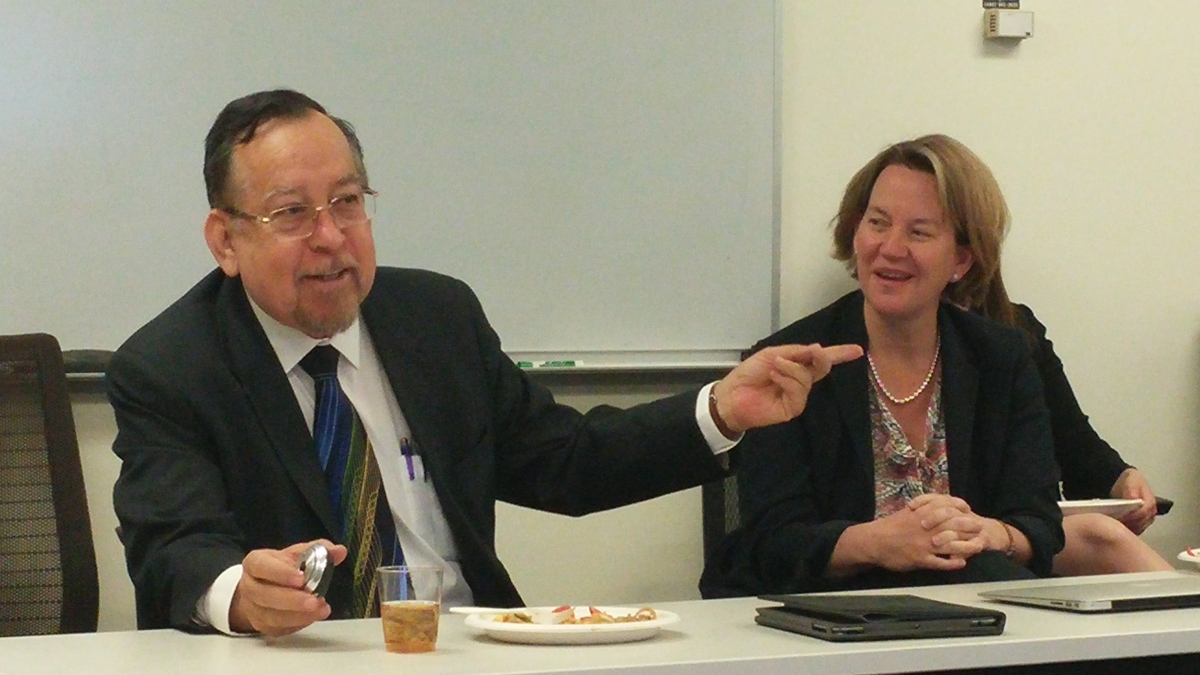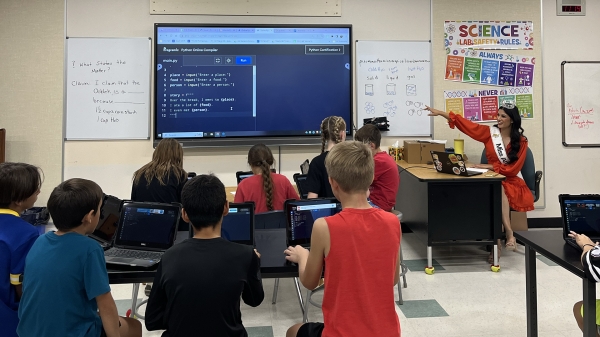Former Mexico cabinet member talks big changes in future of energy

Dr. Hector Moreira, former head of strategic planning for then-Mexican President Vicente Fox and now adjunct faculty member as ASU's School of Sustainability, discusses Mexico's energy reform during a talk at Wrigley Hall on April 1. Seated next to Moreira is Kris Mayes, professor at the School for the Future of Innovation in Society. Photo by Jerry Gonzalez/ASU
Mexico’s emerging energy reforms and the rise of natural gas signal a paradigm shift where new opportunities will arise in North America, said the former head of strategic planning for then-Mexican President Vicente Fox during a talk in Tempe on April 1.
Dr. Hector Moreira, who is also adjunct faculty in Arizona State University’s School of Sustainability, told faculty, students and staff gathered for a talk in Wrigley Hall that change is coming as countries transition from coal and oil as primary energy sources to electricity produced from natural gas.
“We’re entering a new era, which is the era of natural gas,” said Moreira. “You are going to become dominant if you have natural gas reserves.”
The U.S. is the largest producer of natural gas; the U.S., Mexico and Canada together account for 27 percent of the world’s production, comparable to the Middle East, said Moreira. This is good news at a time when two major changes are looming — a “revolution” in the car industry and the privatization of Mexico’s energy sector.
“North America has one of the world’s largest automotive industries, and also it’s an area that is funding all the energy required to the new-generation cars,” said Moreira.
Those new-generation cars are electric, he said. They aren’t the norm yet, but that change is coming and it will be quick. The first cars were mass produced in the U.S. in the early 1900s, and within a decade the process was standardized and millions of cars were on the road, he said.
“We have to be ready for that,” said Moreira. “Remember, when the change comes, it comes very fast … not everybody has an electric car now. They will very soon.”
One of the most significant changes in Mexico’s history is the privatization of the energy sector as part of reforms currently being implemented. It will be free-market conditions with the state leading and regulating the national energy sector while maintaining ownership of the resources beneath the subsoil. Once the resources come out of the subsoil, they no longer belong to the state.
“It’s a total 180-degree change,” said Moreira. “They are now creating Mexican oil companies, truly Mexican, with Mexican owners. They are to be private companies competing on equal grounds with any other of the private companies.”
The change was inevitable as Pemex — the state-owned oil monopoly and backbone of the nation’s energy production — has become unaffordable at a time when Mexico is unable to sustain its population’s annual 5 percent energy demand increases. Just as significant is the fact that within 10 years Mexico must close all its coal and fuel oil plants due to environmental agreements.
“So now we have to build a whole new amount of power generation based on natural gas or renewables, and at least 25 percent has to be renewable,” said Moreira. “There’s no experience in Mexico on how to combine either.”
Mexico’s energy reforms not only open the door for private investors but also for U.S. knowledge, Moreira said. Arizona’s expertise in power generation and distribution can be instrumental to the Mexican effort.
“Arizona is probably the state that has been able to combine better conventional and nonconventional (power) generation,” he said. “And now the idea in Mexico is that they have to do that.”
Transforming from a state-owned energy industry to private businesses and corporations is not without challenges. Countless technical details must be worked out, such as stabilizing power lines from various contributors and regulating processes. Social aspects also have to be considered when new infrastructure goes up.
“So one of the issues when deregulation of this magnitude occurs, it’s that it’s a great business opportunity and it’s a moment when inequalities are sharpened,” said Marisa Duarte, professor at ASU’s School of Social Transformation. “Because everybody wants to invest in those communities that are going to produce the greatest return on investment most quickly.”
Government oversight is important to ensure land rights and permissions are agreed upon, said Duarte. Otherwise, for example in the U.S., it can take 10 to 20 years for groups to organize and be able to take their grievances to the federal government so regulations or incentives can be established.
Mexican law requires businesses or investors to first get a government permit to build infrastructure and then they must negotiate with the landowner, said Moreira. Landowners typically are entitled to three types of payments from a business. If an agreement is not reached, the case goes to court.
As Mexico shifts to a privatized energy sector, there will be many opportunities and hurdles. Institutions of higher learning on both sides of the border will be vital as all these changes— shift to natural-gas power, the rise of electric cars, Mexico reforms — lead to more North American energy integration.
“We have to change the way we see each other and the way we see the future,” said Moreira. “That takes a lot of discussion and has a lot of aspects, and that’s why universities are the place to have these discussions, because (otherwise) we tend to see only our little part of the world.”
More Science and technology

ASU author puts the fun in preparing for the apocalypse
The idea of an apocalypse was once only the stuff of science fiction — like in “Dawn of the Dead” or “I Am Legend.” However…

Meet student researchers solving real-world challenges
Developing sustainable solar energy solutions, deploying fungi to support soils affected by wildfire, making space education more…

Miss Arizona, computer science major wants to inspire children to combine code and creativity
Editor’s note: This story is part of a series of profiles of notable spring 2024 graduates. “It’s bittersweet.” That’s how…